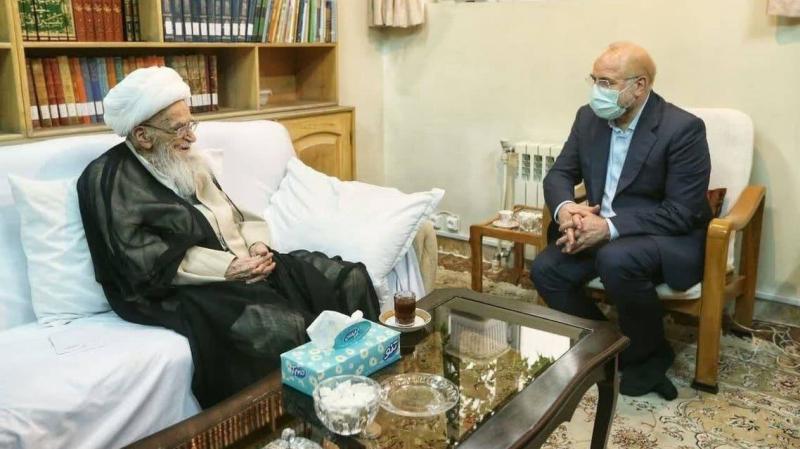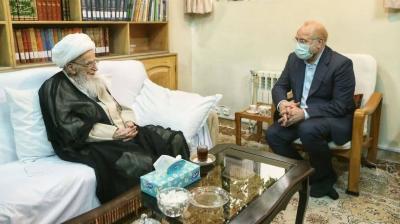Since October 21, a controversy has erupted following statements made by the prominent Iranian cleric Ayatollah Saafi Golpayegani during a meeting with Iranian parliamentary Speaker Mohammad Baqer Qalibaf, in which he called for establishing relations with "all countries of the world," stating that being "upset" with other nations is not in the interest of the Iranian people. Today, the hardline newspaper Kayhan criticized Golpayegani, deeming his statements inaccurate and suggesting they have been exploited by "the spider web of enemies."
Typically, various government officials visit the city of Qom and meet with senior clerics loyal to the regime in an attempt to gain their support by presenting reports on their actions and plans while also listening to their general recommendations, which may or may not be heeded.
**An Unexpected Meeting**
Qalibaf has met with various clerics, but his meeting with Saafi Golpayegani was different and unexpected, as he expressed deep concern over the economic situation and the people's problems. He indicated that severed relations between Tehran and other countries contributed to the poor living conditions of the general populace, advising: "We must have relations with all countries of the world with dignity and from a position of strength; there are many countries that resent us, and this harms our dear people."
After media widely circulated Golpayegani's comments, he, often referred to in Iran as "the Sheikh of Jurisprudents," faced backlash from many regime-loyal circles, leading the Kayhan newspaper, affiliated with the Supreme Leader, to refrain from publishing any news about the meeting between Qalibaf and Golpayegani while covering his meetings with other clerics.
On October 26, the hardline site Raja News critically attacked Golpayegani's advice to Qalibaf in an article penned by a cleric named "Mahdi Jamshidi," causing significant discomfort among clerics loyal to Golpayegani. The article described Golpayegani's views on Tehran's relations with other countries and their connection to inflation and living conditions as "an analysis wrong from head to toe."
**Accusation of Following Secularists**
The article’s writer continued that "Hassan Rouhani deceived the superficial ones... and after eight years, these words come from the mouth of a religious authority," accusing "Ayatollah Saafi Golpayegani of taking his views from secular opinions." The site questioned Golpayegani, asking, "Do you want, as a religious authority, to entangle people in the maze of negotiations, the nuclear agreement, and the West?"
On Saturday, hardline activist "Mohammad Hossein Qadiri Abyaneh" criticized Golpayegani's statements, claiming that "Ayatollah Saafi's views on establishing relations with everyone are wrong... We should not assume that anyone who becomes a source of emulation has views that should be considered religious edicts," advising him to heed the opinions of "experts," identifying himself as one of these experts.
Meanwhile, Kayhan, close to the Supreme Leader, commented on Monday in an editorial by its editor-in-chief Hussein Shari'atmadari regarding Golpayegani’s comments: "The enemy’s spider web was activated immediately after Ayatollah Saafi’s statements, interpreting his words as a protest against severing relations with America and a call to retreat from confronting the Zionist entity," adding, "Unfortunately, his statements lacked sufficient accuracy, leading to misunderstanding... and the rejection of his statements by various factions of the Islamic community and the revolution."
**Supporters of Ayatollah Golpayegani**
In contrast, the attacks against this cleric provoked strong reactions from his supporters, including cleric "Reza Ostadi," who called for Raja News to issue an official apology. Hassan Khomeini, grandson of the regime’s founder Ruhollah Khomeini, described Golpayegani on his Instagram page as one of the "great clerics," whose words do not stem from personal ego or affinity for any faction. Former president Hassan Rouhani mentioned in a related message, "A struggling figure like Ayatollah Saafi Golpayegani, as a defender of Islam and the regime, is a standard for the revolution and struggle, and through him, the claims of those who assert revolutionary ideals should be evaluated."
Following the Iranian prosecutor general’s announcement of opening a case against those who attacked this cleric, Golpayegani’s office issued a statement last night affirming that he does not wish to file a lawsuit against any person, institution, or faction, expressing gratitude to those who defended "this Shiite cleric's strong positions regarding the necessity of addressing the living and economic issues of the people."
**Why the Attack on "Sheikh of Jurisprudents"?**
Ayatollah Saafi Golpayegani is one of the most prominent Shiite clerics in Iran, aged 103, who continues to express his opinions on various religious and political occasions, holding formal and informal meetings with officials and others. He has played a notable role in defending the religious system in Iran since its establishment in 1979, having been appointed by the system's founding Supreme Leader, Ruhollah Khomeini, as a member of the Guardian Council for two terms and also serving on the Assembly of Experts. While he has never criticized the regime directly, he sometimes offers advice for reform. However, it appears that the government of Ebrahim Raisi, supported by the Supreme Leader, is intolerant of criticism from pro-regime factions, fearing a rift in the ruling fundamentalist camp and concern over shifting conflicts from "hardliner-reformist" to "hardliner-hardliner" after the removal of reformists and moderates from power. Given that anti-Western rhetoric and hostility towards certain regional countries characterize the hardline fundamentalist foreign policy, which underpins economic sanctions and their implications for living conditions, the government is unable to tolerate such criticisms, especially from a cleric of Golpayegani's stature.




